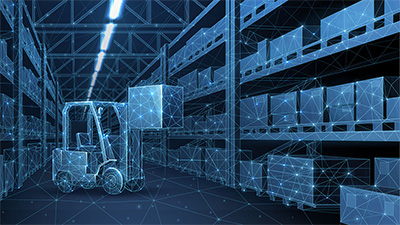
The integration of artificial intelligence (AI) into the logistics industry has the potential to mark a turning point in terms of efficiency and resource management. What initially began with pilot projects has now developed into a mainstay of day-to-day business. In the following areas, the use of AI technologies will lead to a fundamental change in existing processes or is already in the process of doing so.
Forecasting demand and trends: AI systems use algorithms to analyse sales data and consumer behaviour and create precise forecasts. This enables more precise inventory planning, resulting in less overstocking and more efficient warehousing.
Optimisation of route planning: Taking traffic, weather and delivery times into account, the AI calculates the most efficient transport routes. This optimisation saves time and fuel and improves overall delivery performance. However, the complexity of route planning should not be ignored. Information is dynamic and can change as a result. This makes forecasting and therefore automation more difficult.
Monitoring and maintenance of systems: AI systems continuously monitor the condition of machines and systems, recognise the need for maintenance at an early stage and prevent breakdowns. This enables more efficient maintenance planning and extends the service life of the systems.
Improving customer interaction: AI technologies offer personalised recommendations and services based on the analysis of customer interactions. Automated customer service ensures fast and efficient responses, increases customer satisfaction and reduces the workload on staff. However, AI technology cannot replace human expertise, so companies must continue to invest in staff training.
Integration of chatbots for efficient management: AI-based chatbots are used to simplify management processes. They enable quick access to important business data and KPIs, reducing the need for manual intervention. These chatbots can efficiently analyse complex data and provide personalised, data-driven insights.
Scenario planning to minimise risk: AI-supported scenario planning helps companies to identify potential risks in the supply chain at an early stage. By running through various scenarios, preventative measures can be developed and appropriate response strategies devised. This increases resilience to external disruptions and contributes to the flexibility of supply chains.
Optimisation of route planning: Taking traffic, weather and delivery times into account, the AI calculates the most efficient transport routes. This optimisation saves time and fuel and improves overall delivery performance. However, the complexity of route planning should not be ignored. Information is dynamic and can change as a result. This makes forecasting and therefore automation more difficult.
Monitoring and maintenance of systems: AI systems continuously monitor the condition of machines and systems, recognise the need for maintenance at an early stage and prevent breakdowns. This enables more efficient maintenance planning and extends the service life of the systems.
Improving customer interaction: AI technologies offer personalised recommendations and services based on the analysis of customer interactions. Automated customer service ensures fast and efficient responses, increases customer satisfaction and reduces the workload on staff. However, AI technology cannot replace human expertise, so companies must continue to invest in staff training.
Integration of chatbots for efficient management: AI-based chatbots are used to simplify management processes. They enable quick access to important business data and KPIs, reducing the need for manual intervention. These chatbots can efficiently analyse complex data and provide personalised, data-driven insights.
Scenario planning to minimise risk: AI-supported scenario planning helps companies to identify potential risks in the supply chain at an early stage. By running through various scenarios, preventative measures can be developed and appropriate response strategies devised. This increases resilience to external disruptions and contributes to the flexibility of supply chains.
Overall, the logistics industry is facing an unprecedented digital transformation driven by AI technologies. These developments are leading to more efficient resource utilisation, better process control and greater customer satisfaction. It remains exciting to see what further progress AI will make in the logistics industry. The trend clearly shows that AI not only plays a supporting role, but is an integral part of the future of logistics. Nevertheless, there are many companies that are not yet utilising the full potential of AI technology.


